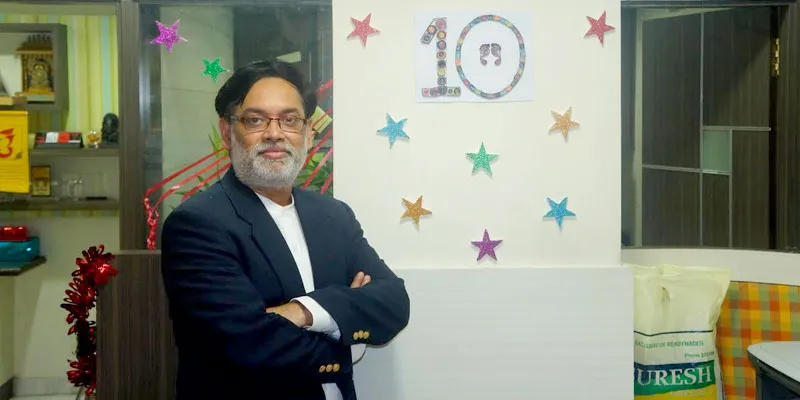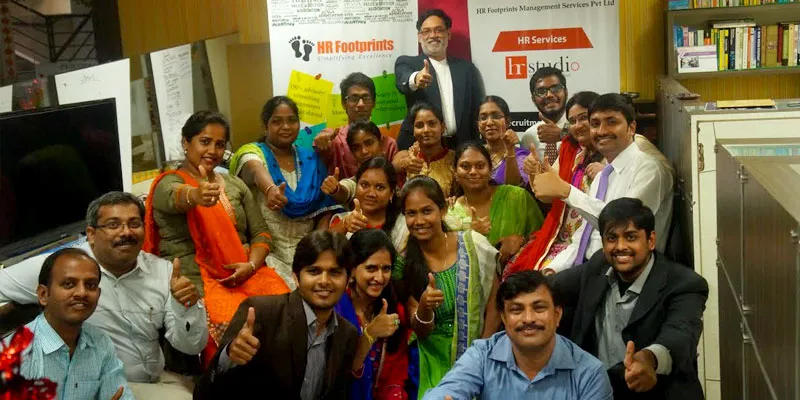
HR Footprints
View Brand PublisherAchieving growth by leveraging people’s capabilities, this Hyderabad-based firm tells you how
A small-scale plastic manufacturer set up essential people management practices that enhanced business performance by leveraging existing talent and augmenting it with talent from outside the organisation.
A 20-year old organisation in the pharma space revamped its people management strategy, and in a five year-span, the company saw its annual turnover increase from Rs 350 crore to more than Rs 1,000 crore.
The common connection here is integrated HR services firm HR Footprints Management Services Pvt Ltd, which works with many such organisations, aligning their business plans with people-related architecture and fuelling growth.
Founder Dr G. Rajkumar, popularly known as Dr Raj, says, “We script these success stories by understanding the business priorities of our clients and aligning them to HR strategies.”

Explaining what constitutes an ‘integrated HR service’, Dr. Raj says, “When it comes to people management, organisations have a wide range of requirements – hiring, talent management, employee engagement, performance management, competency enhancement, among others. By offering integrated services, we become the one-stop-shop for all these very different HR needs. They don’t have to approach multiple service providers for the various service requirements, making it simpler, effective and more efficient to run their organisations.”
The 10-year-old HR Footprints offers HR services, learning, and recruitment services, under the brand names of HR Studio, LQube and Talentmandi respectively.
While HR Studio aims to add value to clients across industries in the design and implementation of HR and Organisational Development (OD) interventions, Talentmandi provides innovative hiring solutions across levels. LQube is the learning services vertical of HR Footprints, which delivers quality learning solutions to organisations to enhance their performance, productivity, and bottom line results.
The first step
It was in 1997 when Dr Raj first set his sight on the dream of starting an organisation that could capitalise on the potential of people. “It took me close to nine years to gather the strength and courage and make that beginning,” he says. HR Footprints began operations in 2006, and has so far enabled 300 organisations to achieve growth by leveraging people’s capabilities. The organisation has to its credit 150+ advisory consulting assignments in India and abroad, 600 search assignments globally, and has trained 20,000 professionals across organisations. Dr Raj says that they have been able to achieve this kind of scale primarily due to word-of-mouth publicity and references.
According to the founder, while the take-off has been fairly easy, “sustaining quality of delivery, and scaling up,” have been critical challenges in their decade-long journey. However, he adds, “We will not dilute the quality of our services in pursuit of speedier growth.” Reflecting on his decade-long entrepreneurial journey, the founder, says,
“Entrepreneurship is all about a dream and delivering that dream; you need to have a desire to make a difference, a clear vision of your dream, and abundant perseverance to deliver. Entrepreneurship to me is lot of freedom and also a lot of responsibility. It is unending excitement.”
With a 25-member team, HR Footprints is headquartered in Hyderabad and serves clients across India and the globe.

On hiring the right talent and best practices
“I believe that more than talent you need passion: it makes us learn; it helps us persist; it inspires,” says the HR advisor and executive coach.
When asked for his take on how to address a key challenge of the startup ecosystem – finding the right talent – he says,
“We help many organisations in sourcing talent, so we understand how difficult it is, especially for entrepreneurs. One needs to take risks in building a talent pool. As an organisation, our own philosophy is to look for passionate people and groom them. If you are serious about building a sustainable organisation, build a core team that is passionate about what you do.”
He shares some HR best practices which he believes startups should integrate into their organisational culture.
“Focus on putting together a set of credible people policies and walk the talk. Startups need to understand that their ‘capital’ is trust and credibility. If that erodes, it will be extremely difficult to attract good people to work for you.”
“We do come across organisations which think that people can be bought with money. While this may be true, you need to think about what kind of people you get with such an approach. Do they help you build the right culture? Will they stick with you during turbulent times? It is not utopian, but sheer pragmatism to look for culturally aligned, value-based people during your startup’s early stages. It is tough to find, but be patient.”
Technology and HR
Dr Raj observes that today there is greater realisation that HR is critical for business, and that organisations are more open to innovative ideas for people management. “There is more openness towards tech-based HR solutions, and today the use of technology goes much beyond the traditional ‘HRIS’ (HR Information System).”
He explains that HR Footprints’ concept of HR Studio, Talentmandi.com and LQube have emerged due to these changing trends, and each of these three verticals are strategically positioned to leverage technology en route to scale-up plans. “Technology can aid in talent sourcing, delivering learning solutions and providing excellent back-end analytics,” says Dr Raj. At an organisational level, technology is helping HR Footprints garner a wider reach and scale faster by leveraging their decade-long offline experience. Technology also helps the team to design contemporary HR systems.
HR Footprints has witnessed a steady 30 percent YoY growth with regard to new client acquisition. Driven by technology and new strategies, the organisation expects this number to increase multi-fold, and “drive the business towards sustaining profitability and creating value for people and organisations, for the years to come”.







